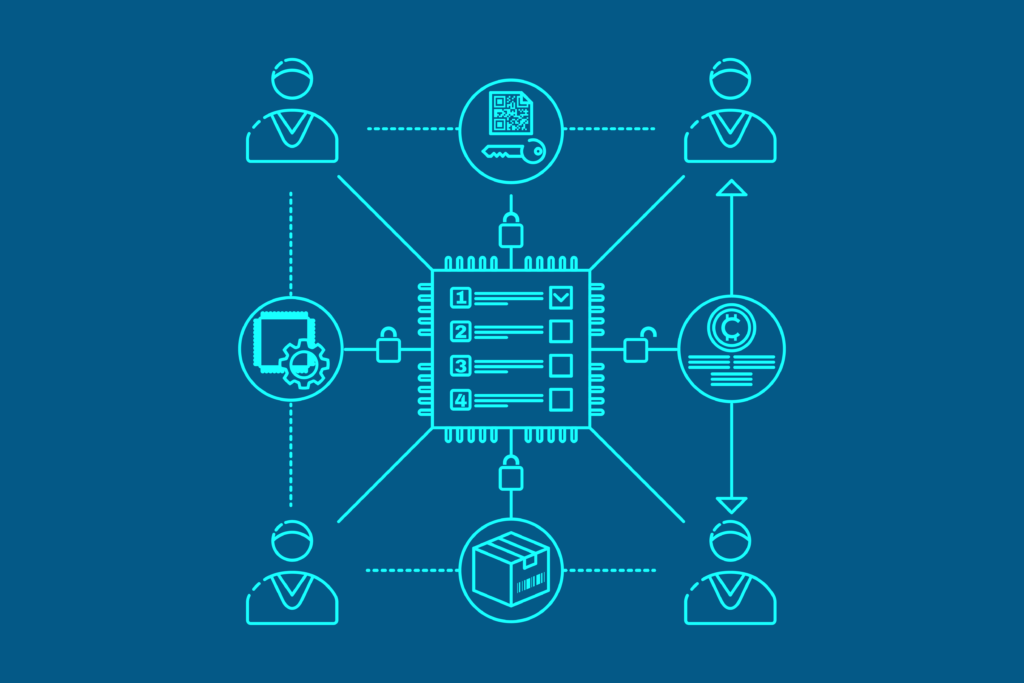Imagine a world where business transactions are executed automatically, securely, and transparently, without the need for intermediaries or mountains of paperwork. This is the revolutionary potential of smart contracts, self-executing stored on a blockchain that automates agreements and eliminates trust issues. Currently, the smart contracts sector is set for remarkable growth, with forecasts suggesting a surge from $2.20 billion in 2023 to an estimated $8.79 billion by 2030, driven by a robust Compound Annual Growth Rate (CAGR) of 26.3% over the forecasted period.
While the concept dates back to the 1990s, it wasn’t until the emergence of blockchain technology that smart contracts became a viable reality. Today, they are poised to transform numerous industries, offering businesses a multitude of benefits.
What Does Smart Contract Blockchain Mean?

Blockchain smart contracts are a kind of algorithm for certain actions integrated into the blockchain code. If the established agreements, which are spelled out in it, are observed, the sequence is automatically triggered.
For example, take the simplest transaction—the process of buying and selling cryptocurrency between users. It takes place according to the requirements of anonymity and is not regulated by intermediary organizations. It can be executed thanks to blockchain smart contracts, which prescribe a detailed transaction algorithm between two parties.
Smart contacts eliminate the opportunity for fraud on both sides and make it possible to conduct the trade in a specific formula of sequential actions.
The concept of smart contracts first emerged in 1996, envisioned by Nick Szabo as a way to automate digital currency agreements. However, it wasn’t until the advent of blockchain technology in 2008, with the launch of Bitcoin, that this vision became a reality. In 2013, Ethereum became the first blockchain platform to fully integrate smart contracts, paving the way for a new era of decentralized automation.
How Do Smart Contracts Work?

Smarts are part of the blockchain software code and work directly within the network. They perform the function of paper contracts but in the digital field. The terms are not written in pen on paper, but using mathematical algorithms and programming languages.
Just like in a paper contract, the terms are subject to mandatory execution. Only after contract signing will the transaction be realized and users will receive the conditioned result. Once the algorithm is completed, smart contracts on the blockchain become part of the registry, entering the blockchain itself. The basic principle of a smart contract is the complete implementation of a conditional sequential algorithm.
Here’s a simplified breakdown of how smart contracts work:
- Agreement creation: The terms of the agreement are coded into the smart contract, outlining the conditions, actions, and participants involved. This process typically involves lawyers, developers, and domain experts working together to ensure the contract accurately reflects the intended agreement and minimizes potential loopholes.
- Deployment: The contract is deployed onto the chosen blockchain network, incurring a deployment fee that varies depending on the platform, network congestion, and contract complexity. This step involves validating the smart contract code and ensuring it meets the platform’s security standards.
- Execution: When the predetermined conditions are met (e.g., payment received, goods delivered), the smart contract automatically executes the agreed-upon actions, such as transferring funds, releasing goods, or updating records. This execution happens automatically and transparently on the blockchain, without the need for manual intervention.
Types Of Smart Contracts

There are several basic types of smart contracts, which are classified according to different criteria:
- According to the execution environment, smart contracts can be centralized and distributed.
- By degree of anonymity, smart contracts are confidential, partially open and fully open.
- According to the mechanism of initiation, smart contracts can be limited and preset.
Also, the degree of automation of the smart contract plays an important role. It indicates whether the digital agreement can function on its own or additional physical paper-based media will be required. So, the types of smart contracts in the blockchain are:
- Fully automated — no hard copy is required.
- Partially automated — a paper copy of the smart contract is required.
- Automated — mostly in storage.
Prospects And Disadvantages Of Smart Contracts

Smart contract technology is a useful system that simplifies a lot of routine processes, bringing them to full automation without human involvement. It is actively operated in most existing blockchains because of its significant advantages. The main benefits of smart contracts in blockchain are:
- Eliminating intermediaries. Smart contracts in blockchain allow customers to completely (or partially) get rid of the involvement of third individuals to control transactions. This stops the impact of human error, makes trading more secure and transparent, and significantly reduces overhead costs.
- Security. All information about the terms of the contract and how they are observed is in the distribution form (in the register). This reduces the risk of fraud and other manipulation from both sides.
- Transparency. Any participant can audit and check the correctness of the fulfillment of blockchain with smart contract conditions at any convenient time.
- Development of spheres. Smart contracts technology allows users not only to improve existing companies in different business areas but also to create new models and financing services.
- Improved traceability. Smart contracts enable real-time tracking of assets and data throughout their lifecycle, enhancing supply chain management and logistics. This allows businesses to gain greater visibility into their operations, identify potential bottlenecks, and optimize their supply chains.
- Reduced disputes. The self-executing nature of smart contracts minimizes the potential for disagreements and disputes arising from misinterpretations or human error. By clearly defining the terms and conditions within the code, smart contracts leave no room for ambiguity and ensure that the agreement is executed as intended.
- Streamlined processes. Automating agreements eliminates manual tasks, such as paperwork verification and approvals, saving time and resources. This allows businesses to focus on core activities and improve operational efficiency.
Despite the significant pluses of smart contract technology, this is a fairly new field, which has its disadvantages and challenges:
- User distrust. A rather pressing problem is the low credit of trust. Unfortunately, not everyone believes that technology can fully automate routine processes and completely eliminate the human factor in the form of an intermediary.
- Lack of legal justification. Smart contracts do not have a certain legal status, which makes the permitting process very difficult.
- Settlement in cryptocurrency. All calculations in smart contracts are made in digital assets. This point only attracts some users, as there are certain classes of people who are not interested in cryptocurrency and need help understanding how it works.
- Weak oracle system. Smart contracts technology needs to acquire a more developed visionary system. This can be done by improving the quality of external information sources.
- Smart contract risk of error. In the legal component of smart contracts, it is possible to make a serious mistake when translating regulations into software code, which will have negative consequences when processing the transaction.
How Do Smart Contracts Work In Ethereum And Bitcoin Blockchains?

During the expansion phase and after the official implementation of Bitcoin, its developers didn’t intend to integrate smart contract technology. It was used only to process transaction data. However, in the BTC blockchain, it is partially possible to implement smart contract technology in some areas of activity. Such digital contracts would be spelled out based on simplified logic functions.
- Escrow. During transaction processing, coins are first deposited with an intermediary who acts as a guarantor and oversees the correct execution of the transaction.
- Safe. Access to the account is blocked until a certain period is reached.
- Multi-signature. Confirmation of the correct execution of the operation is carried out with the involvement of several predetermined participants.
- Testament. If there is a problem because of a lack of a wallet’s functioning after the set time interval, the funds involved in the transaction are transferred to another address, the so-called “heirs”. The set time counter is reset when the account holders use the vault.
Ethereum and Bitcoin have one more fundamental difference — the status of transaction definition. ETH blockchain identifies a transaction as a complete part of the network ecosystem, while BTC blockchain defines it as a standalone element.
Ethereum allows the development of smart contracts, which will then carry out the process of generating new tokens according to the ERC-20 standard. In many ways, the innovations of the Ethereum blockchain have made it possible to noticeably simplify the interaction between various platforms, services, and crypto wallets.
How Can Smart Contracts Skyrocket Businesses? Top Use Cases

Many processes in the finance industry are still accompanied by piles of related paperwork, which complicates account creation for a significant share of intermediaries’ revenues. The introduction of smart contracts can simplify these operations, so the major market players have begun development in this area. Insurance companies are also actively experimenting with the use of smart contracts.
- German insurance giant, Allianz used smart contracts to automate insurance payments for natural disasters.
- Barclays uses smart contracts to automate payment and change of ownership in a transaction.
- HSBC and Bank of America replaced letters of credit (a written guarantee from the payer’s bank to the payee’s bank) with smart contracts.
- IBM Food Trust uses smart contracts to track and trace food products throughout the supply chain, ensuring transparency and food safety.
The full introduction of smart contracts into the election system is not yet a prospect for the very near future. However, government services are already working hard on the most obvious advantage of blockchain: the secure storage of documents.
The Swedish Cadastral Office, for example, is functioning with blockchain startup ChromaWay, a consulting firm, and mobile service provider on its blockchain solution. It aims to eliminate the errors associated with manual data entry and increase the reliability of documentation transfers. ChromaWay’s smart contract system is used to digitally document the transfer of real estate ownership.
Technical Considerations for Implementing Smart Contracts
Implementing smart contracts effectively requires careful planning and consideration of several technical aspects:
- Choosing the right blockchain platform: Different blockchain platforms offer varying functionalities, fees, and security features. Businesses need to carefully evaluate their specific needs and choose a platform that best suits them. Factors to consider include scalability, transaction speed, programming language support, and regulatory compliance.
- Smart contract development process: Developing secure and reliable smart contracts requires specialized expertise in blockchain technology and programming languages specific to the chosen platform. The development process typically involves several stages, including:
- Requirement gathering and analysis: Clearly define the functionalities and objectives of the smart contract.
- Design and prototyping: Creating a detailed blueprint of the contract’s logic and functionalities.
- Coding and development: Implementing the smart contract using the chosen platform’s programming language.
- Testing and auditing: Rigorously testing the contract for functionality, security vulnerabilities, and potential edge cases.
- Deployment and monitoring: Deploying the contract onto the blockchain network and monitoring its execution for any issues.
- Security best practices: Implementing robust security measures is crucial to prevent vulnerabilities and potential exploits. This includes:
- Code audits: Regularly conducting security audits by experienced professionals to identify and address potential vulnerabilities in the smart contract code.
- Secure coding practices: Following secure coding practices to minimize the risk of introducing vulnerabilities during development.
- Multi-signature authentication: Utilizing multi-signature wallets or other mechanisms to require multiple approvals for critical actions within the smart contract.
The Role of Smart Contracts in the Future
Smart contracts hold immense potential to revolutionize how we conduct transactions and interact with the digital world. As blockchain technology matures and becomes more widely adopted, we can expect to see smart contract use cases play an increasingly significant role in various aspects of our lives. Here are some key areas where smart contracts are likely to make a significant impact:
- Increased efficiency and automation: Smart contracts can automate many manual tasks currently performed by intermediaries like lawyers, banks, and escrow services. This can significantly reduce transaction costs, streamline processes, and improve overall efficiency.
- Enhanced trust and transparency: By storing agreements and execution details on a secure and transparent blockchain, smart contracts foster trust between the parties involved. This eliminates the need for intermediaries and reduces the risk of fraud or manipulation.
- New business models: Smart contracts enable the creation of entirely new business models that were previously not feasible. For example, they can facilitate decentralized marketplaces, peer-to-peer lending, and autonomous organizations (DAOs).
- Integration with the Internet of Things (IoT): As IoT devices become more prevalent, smart contracts can be used to manage and automate interactions between them. This can enable innovative applications in areas like supply chain management, logistics, and smart cities.
- NFT contracts: A specific type of smart contract, NFT contracts, are already playing a transformative role in the digital asset space. They enable the creation and management of unique digital tokens representing ownership of various assets, from artwork and collectibles to virtual land and even real-world assets.
Wrapping Up
Many organizations are actively working to fix existing flaws in smart contract technology. Analysts say that in the near time, the technology will be fully legally justified, which will greatly enhance people’s credibility.
In the coming years, smart contracts will be able to replace most of the document-based transactions in finance, as many of the world’s leading banks are experimenting with blockchain technology and moving their routines to it. The time when smart contracts will also be used at the government level to streamline reporting processes and documentation is not far off. Nevertheless, whether this is true or not, we will see in a while.




